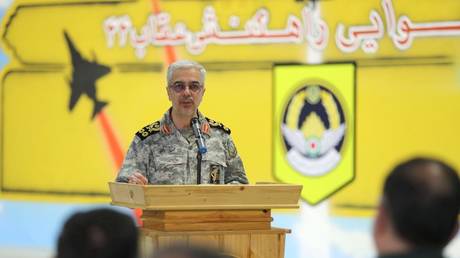ARTICLE AD BOX
Countermeasures could involve a “strike or no strike,” a military spokesperson had said
The Israeli military has presented a range of options to the government on how to respond to the recent Iranian airstrikes, Israel Defense Forces (IDF) spokesperson Peter Lerner told journalists on Monday, as reported by ABC news.
Tehran launched several waves of drones, cruise missiles and ballistic missiles at Israel over the weekend, in response to the bombing of the Iranian embassy in Damascus earlier this month. The strike on the consulate – which West Jerusalem has neither confirmed nor denied – killed seven members of the Iranian military, including two high-ranking generals.
Iran has said its retaliatory operation destroyed two Israeli military bases, although the IDF claimed it intercepted 99% of the more than 300 drones and missiles launched at the country, admitting only “minor damage” to Nevatim Airbase.
Read more ‘Punishment’ of Israel completed – Tehran
‘Punishment’ of Israel completed – Tehran
“Just because we were successful in intercepting, we should not underestimate what Iran did,” Lerner said. The Israeli government is “currently reviewing the options” after the “IDF has presented what it believes could be done,” ABC quoted the spokesman as saying. The response could entail a “strike or no strike” Lerner stated, adding that the government could make a decision as early as Monday.
Despite “emotions running high” among the Israeli leadership following the airstrikes, US President Joe Biden has urged Israeli Prime Minister Benjamin Netanyahu to show restraint in an effort to avoid further military escalation, the New York Times reported on Sunday, citing a senior administration official.
Iran has warned that a military response would prompt an even bigger escalation. Tehran sees its airstrikes as a success and has “no intention of continuing the operation,” Iran’s chief of staff of the armed forces, Major General Mohammad Bagheri, announced on Sunday. He warned that if Israel responds with force, “the next operation will be much more extensive.”
.png)
 7 months ago
8
7 months ago
8








 English (US)
English (US)